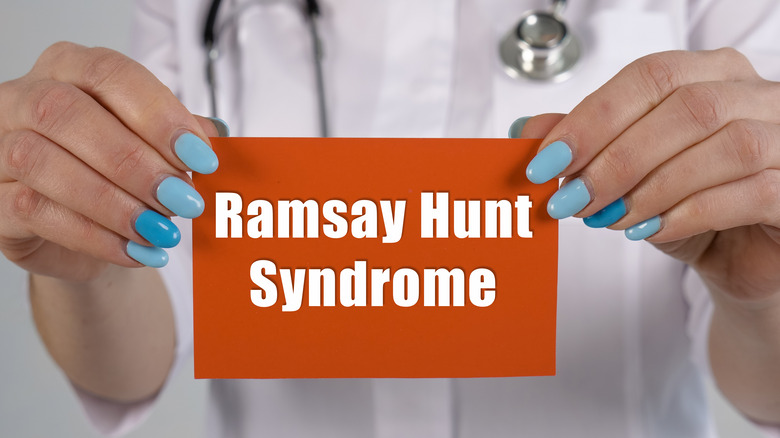Justin Bieber's Ramsay Hunt Syndrome Diagnosis Explained
Pop star Justin Bieber shared recently on Instagram that he has been diagnosed with Ramsay Hunt Syndrome. Ramsay Hunt Syndrome is a rare condition that is caused by the varicella-zoster virus, which is the same virus that causes chickenpox. The condition results in a rash and blisters, as well as facial paralysis (via Mayo Clinic).
After postponing two recent concert dates, the singer shared a video of himself explaining the recent health issues he has been facing. "As you can probably see from my face, I have Ramsay Hunt Syndrome," Bieber said in the video. "...As you can see, this eye is not blinking, I can't smile on this side of my face, this nostril will not move. So, there's full paralysis on this side of my face" (via ET). The singer also asked fans to be patient with him as he recovers before he is able to resume shows. Bieber also noted that he is currently doing "facial exercises" as part of his treatment plan, as well as getting plenty of rest.
What is Ramsay Hunt Syndrome?
Ramsay Hunt Syndrome is a condition that results from an infection of the facial nerve. This can cause a number of symptoms, including paralysis on one side of the face, pain, and blistering around the ear (via Mount Sinai). In some cases, people may also experience hearing loss or vertigo. This condition is quite rare and only about 5 in every 100,000 people develop it every year in the United States (via Rare Diseases). Ramsay Hunt Syndrome was discovered by and named after James Ramsay Hunt, who first described the condition in 1907.
Ramsay Hunt Syndrome is often compared with Bell's palsy, which is also a condition that results in paralysis of the facial nerve. However, according to Johns Hopkins Medicine, Bell's palsy does not usually result in the same level of pain and blistering as Ramsay Hunt Syndrome. It is unclear what causes Bell's palsy, while Ramsay Hunt Syndrome is known to be caused by the varicella-zoster virus.
What causes this condition?
As mentioned before, Ramsay Hunt Syndrome is caused by the varicella-zoster virus. This is the same virus that causes chickenpox. After a person has chickenpox, the virus lies dormant in the nerve cells and may never become active again. However, in some cases, the virus can reactivate years later and cause shingles. Ramsay Hunt Syndrome occurs when a shingles outbreak affects the facial nerve near one of your ears, which results in the symptoms of paralysis and hearing loss (via Mayo Clinic).
Although anyone who has had chickenpox is at risk of developing Ramsay Hunt Syndrome one day, it is unclear why it affects some people and not others. This condition is most common in people over the age of 50 and rarely affects children. Ramsay Hunt Syndrome is not contagious, but the varicella-zoster virus can cause chickenpox in people who have not been vaccinated against the condition or have not had chickenpox previously.
Symptoms of Ramsay Hunt Syndrome
The most common symptom of Ramsay Hunt Syndrome is a rash that appears on one side of your face. This rash is usually accompanied by blisters and can be extremely painful (via Healthline). Paralysis on the affected side of the face is also common. One side of your face may be fully paralyzed, or you may experience tingling and numbing in the area. Other symptoms can include hearing loss, vertigo, and pain in the affected ear. In some cases, people may also experience difficulty speaking or swallowing.
These symptoms can appear suddenly and are often more severe on one side of the face than the other. In some cases, people may only experience a milder form of the condition with few symptoms. If you experience any of these symptoms, it is important to see a doctor as soon as possible, as early treatment can improve your chances of a full recovery. If Ramsay Hunt Syndrome is left untreated, it can cause permanent paralysis and hearing loss.
How Ramsay Hunt Syndrome is treated
Ramsay Hunt Syndrome is usually treated with a course of antiviral medication, which can help to shorten the duration of the condition and reduce the severity of symptoms (via Medical News Today). In some cases, your doctor may also prescribe steroids to help reduce inflammation. If you experience pain, your doctor may recommend over-the-counter pain medication or a topical cream to help relieve symptoms.
If you experience paralysis or weakness in your face, there are a few things you can do to help improve facial muscle function. One option is to perform facial exercises, which can help to stretch and strengthen the muscles in your face (via Physical Therapy & Rehabilitation Journal). You can also try using an eye patch or sunglasses to protect your eye from injury if you are unable to close it fully. With early detection and the right treatment plan, many people with Ramsay Hunt Syndrome make a full recovery.





